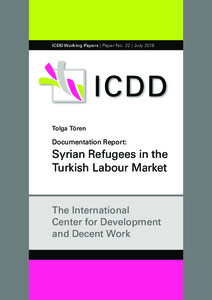| dcterms.abstract | This report aims to document and evaluate the outcomes of the regional workshop on “Syrian Refugees and Integration of Syrians” held in İstanbul in February 2017. The workshop was organized by the Global Labour University (GLU) Alumni Network in Turkey in collaboration with International Centre for Development and Decent Work (ICDD), the University of Kassel, German Academic Exchange Service (DAAD), International Labour Organization (ILO), Global Labour University (GLU), Boğaziçi University Centre for Educational Policy Studies (BEPAM) and Friedrich-Ebert-Stiftung (FES) Turkey Office, with particular focus on the composition and narratives of the Syrian refugees through the “fishbowl session”.The report finds that Syrian refugees have a very difficult life in Turkey in terms of working conditions, living conditions, discrimination, bureaucracy, lack of enough regulation, child education, language barriers etc. One of the most important concerns for Syrian refugees is child labour. Owing to unemployment of Syrian adults, most parents are forced to send their kids to work. With ineffective state control on employment and labour market, employers prefer to recruit children who are paid low wages, thereby enabling them to make higher profits. The other problems Syrian refugees face in the labour markets are low wages, long working hours, employment without social insurance, late payment or non-payment of the wages, discrimination at the workplace, etc. Regarding accommodation, majority of the Syrian refugees live in a populous household, paying higher rents for lower quality houses in comparison with domestic people. In addition, the situation of Syrian refugees in Turkey has a strong gender dimension. The Syrian females work as precarious workers at the workplace. They are the most affected and vulnerable workers. In addition, Syrian female refugees also take the responsibility of the education of the children who face different types of discrimination at school, with which again Syrian female refugees have to struggle.These problems have created barriers for Syrian refugees in exercising their rights at the workplace and in taking services from public institutions including healthcare and education. Besides, as findings show, the Syrian refugees are placed in the lowest strata of the labour markets of Turkey. | eng |


